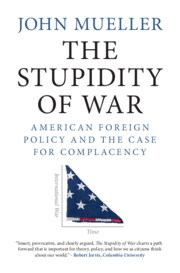Book contents
- The Stupidity of War
- The Stupidity of War
- Copyright page
- Dedication
- Contents
- Figures
- Acknowledgements
- Additional material
- Prologue The Rise of War Aversion and the Decline of International War
- Part I Assessing the Threat Record
- Part II Evaluating Present Threats
- 6 The Rise of China, the Assertiveness of Russia, and the Antics of Iran
- 7 Proliferation, Terrorism, Humanitarian Intervention, and Other Problems
- 8 Hedging, Risk, Arrogance, and the Iraq Syndrome
- Afterword Aversion to International War as an Explanatory Variable
- Appendix: A Sardonic Litany
- Notes
- References
- Index
8 - Hedging, Risk, Arrogance, and the Iraq Syndrome
from Part II - Evaluating Present Threats
Published online by Cambridge University Press: 01 March 2021
- The Stupidity of War
- The Stupidity of War
- Copyright page
- Dedication
- Contents
- Figures
- Acknowledgements
- Additional material
- Prologue The Rise of War Aversion and the Decline of International War
- Part I Assessing the Threat Record
- Part II Evaluating Present Threats
- 6 The Rise of China, the Assertiveness of Russia, and the Antics of Iran
- 7 Proliferation, Terrorism, Humanitarian Intervention, and Other Problems
- 8 Hedging, Risk, Arrogance, and the Iraq Syndrome
- Afterword Aversion to International War as an Explanatory Variable
- Appendix: A Sardonic Litany
- Notes
- References
- Index
Summary
The perspective is not isolationist: the United States should be a constructive world citizen. Nor does it arise from pacifism, although sometimes it may be wise not to seek to win wars, but to end them. Given war aversion and the essential absence of threat, military spending is hugely excessive. However, even if the US should substantially disarm, it is probably wise to keep some military forces to carry out limited missions, to hedge a bit against the highly unlikely rise of an effective adversary, and to develop a capacity to rebuild. There would be risk if military forces were very substantially reduced, but experiences in Vietnam and Iraq suggest that there is risk as well in maintaining large forces-in-being that can be deployed in an under-reflective manner. It also facilitates misguided militarized assertiveness, fatuous political rhetoric, and arrogance. The American public has not become newly isolationist or militaristic. It has long been willing to engage internationally, but not to expend American lives in costly and questionable foreign adventures: the 9/11 wars are not indicators of change in this. Indeed, an Iraq Syndrome has taken hold, and military intervention, particularly with ground troops does not seem to have much of a future.
Keywords
- Type
- Chapter
- Information
- The Stupidity of WarAmerican Foreign Policy and the Case for Complacency, pp. 193 - 206Publisher: Cambridge University PressPrint publication year: 2021

